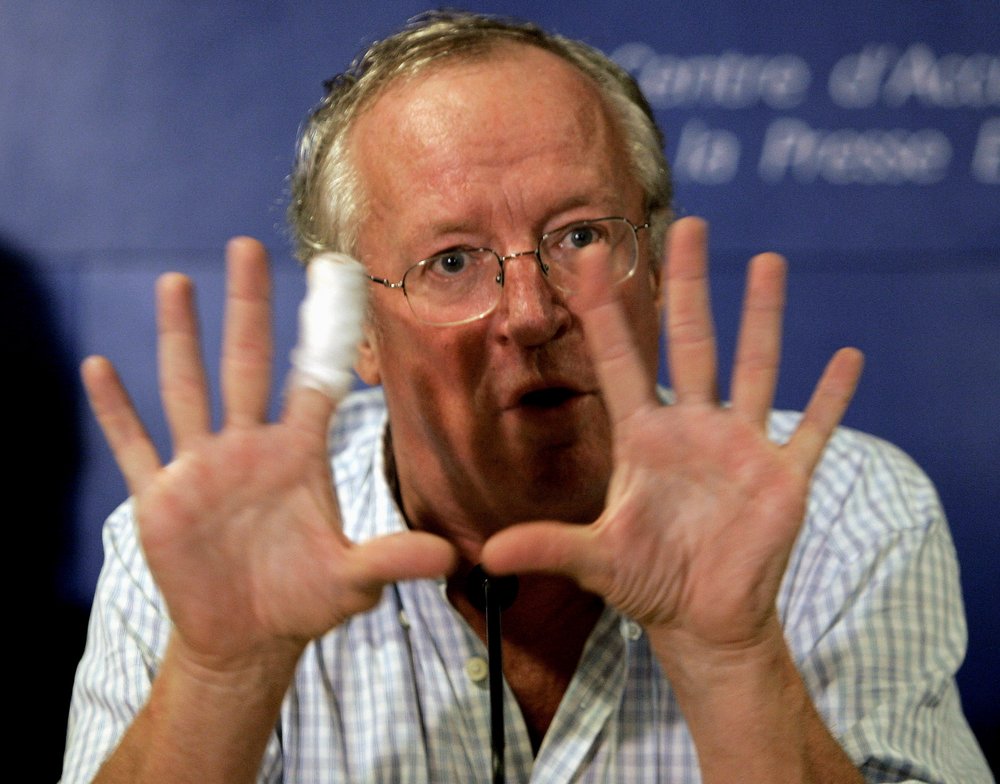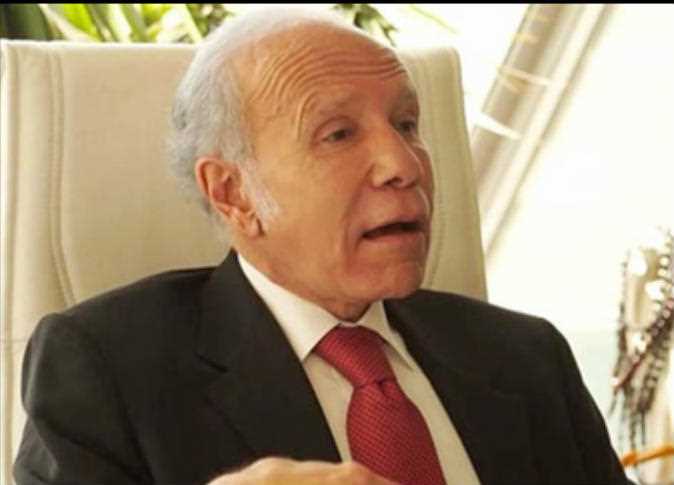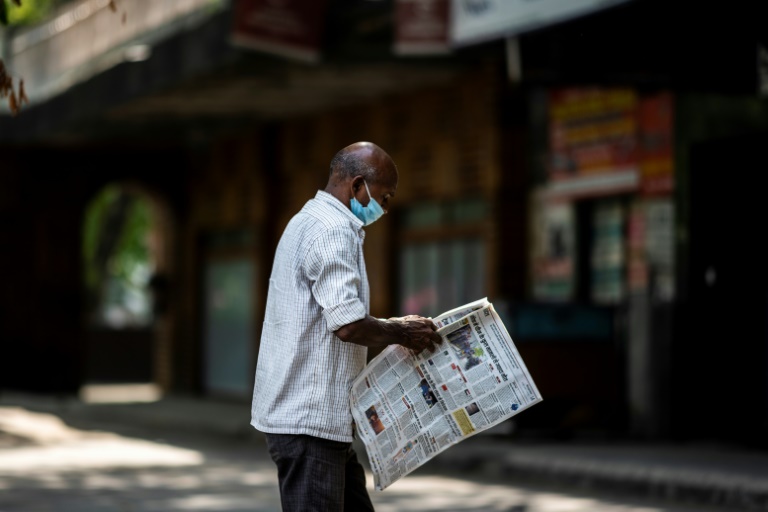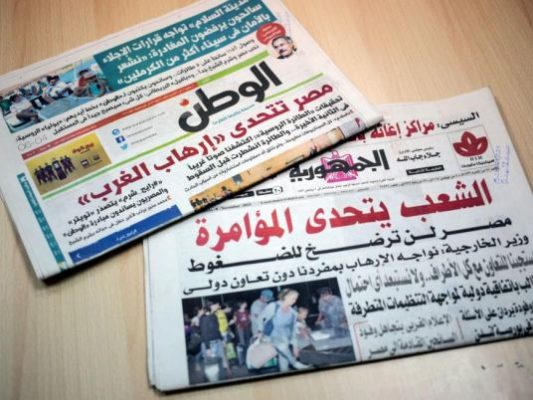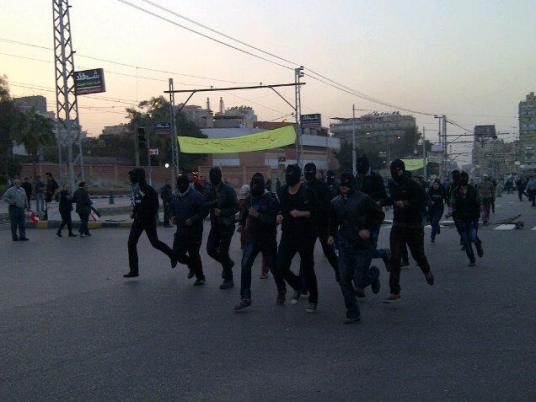
The headlines of Egypt's various newspapers on Wednesday highlight the ongoing street and political deadlock, but from two different perspectives.
While state-owned newspapers and the mouthpiece of the ruling party celebrate the decision of Prosecutor General Talaat Abdallah to arrest all members of the contentious Black Bloc protest group, other independent newspapers criticize the decision. The latter also deems the president’s curfew on canal cities as "gone with the wind."
State-owned Al-Ahram reports that there is "wide condemnation," of the "masked protesters" who called themselves the Black Bloc as the prosecutor general orders their arrest. The Black Bloc is a largely unknown group whose motives remain unclear, and who generally refuse to speak to the media. Fellow state-owned newspaper Al-Akhbar says that security institutions will reveal details about the conspiracy of the killing of the revolutionaries.
Yet, the true celebration was on the front page of Freedom and Justice Newspaper, the mouthpiece of the Brotherhood's Freedom and Justice Party, which reports that the top prosecutor ordered the arrest of all "Black Bloc militias."
The newspaper blames recent violence on the opposition National Salvation Front, saying the group practices "electoral blackmailing" and gives violence "a political cover." The second part of the triangle of evil for the FJP’s newspaper is the "seditious media" that exaggerates reporting about "chaos" and incites violence.
But the newest element, according to the paper, is the Black Bloc, which it claims destroys property and uses Molotov cocktails and birdshot.
However, privately owned newspaper Al-Tahrir takes a different angle, reporting on the group's reaction to the prosecutor general’s decision.The newspaper quotes the bloc as saying, "show us how you can,” in what seems to be a challenge to the decision.
The newspaper also quotes rights activist Nasser Amin, who believes that the prosecutor general's decision is illegal, as arrest warrants cannot be issued without specific names and accusations, which the Public Prosecution does not have.
Privately owned daily Al-Watan newspaper reports that the protest group has decided to fully participate in Tahrir Square protests planned for Friday, while warning of possible attempts by the Brotherhood to hire masked thugs to attack mosques and blame the violence on the group.
Privately owned newspaper Al-Shorouk reports on another group named the "Muslimoun," meaning Muslims in Arabic, who are threatening the Black Bloc.
"We have men who love to die in the name of God, as much as you love to be corrupted," the group warns, describing President Mohamed Morsy as the only source of legitimacy.
The persistent flouting of the curfew imposed in canal cities went unreported by state newspapers, while independent ones celebrated residents' protests.
Al-Ahram describes the situation in the canal cities as "careful calmness,” while Al-Akhbar reports on "stability" in Suez and marches in Ismailia and Port Said with protesters chanting "the people and the army are one hand."
Freedom and Justice extolls the blessings of the curfew, calling it a move to reveal "the birds of darkness." The newspaper says that the curfew is a temporary decision to impose security that does not target "peaceful protests."
Al-Shorouk says in its main headline that the curfew is "as if it never happened," reporting on a "charming revolutionary night” in Ismailia and "mass protests" in Suez.
Al-Tahrir says that the canal cities are challenging President Morsy, his party and "his curfew,” displaying a large front-page photo of protesters holding banners that read "There is no state of emergency in the canal cities, Morsy." In Ismailia, there were weddings and football tournaments amid anti-regime protests starting from 9 pm, when the curfew takes effect, while clashes continued unabated in Port Said.
Meanwhile, an initiative from the Salafi Nour Party may be a breakthrough in the ongoing political deadlock, as it backs most of the National Salvation Front's preconditions for a national dialogue with President Mohamed Morsy’s regime.
Al-Watan calls the initiative an "Islamist coup" against the Brotherhood, referring to remarks from Nour Party Spokesman Nader Bakkar criticizing attempts to "Brotherhoodize" the state, while the leader of Jama'a al-Islamiya, Safwat Abdel Ghany, dismisses the national dialogue as “not serious.”
Egypt’s papers:
Al-Ahram: Daily, state-run, largest distribution in Egypt
Al-Akhbar: Daily, state-run, second to Al-Ahram in institutional size
Al-Gomhurriya: Daily, state-run
Rose al-Youssef: Daily, state-run
Al-Dostour: Daily, privately owned
Al-Shorouk: Daily, privately owned
Al-Watan: Daily, privately owned
Al-Wafd: Daily, published by the liberal Wafd Party
Youm7: Daily, privately owned
Al-Tahrir: Daily, privately owned
Al-Sabah: Daily, privately owned
Freedom and Justice: Daily, published by the Muslim Brotherhood's Freedom and Justice Party
Sawt al-Umma: Weekly, privately owned
Al-Arabi: Weekly, published by the Nasserist Party
Al-Nour: Official paper of the Salafi Nour Party

